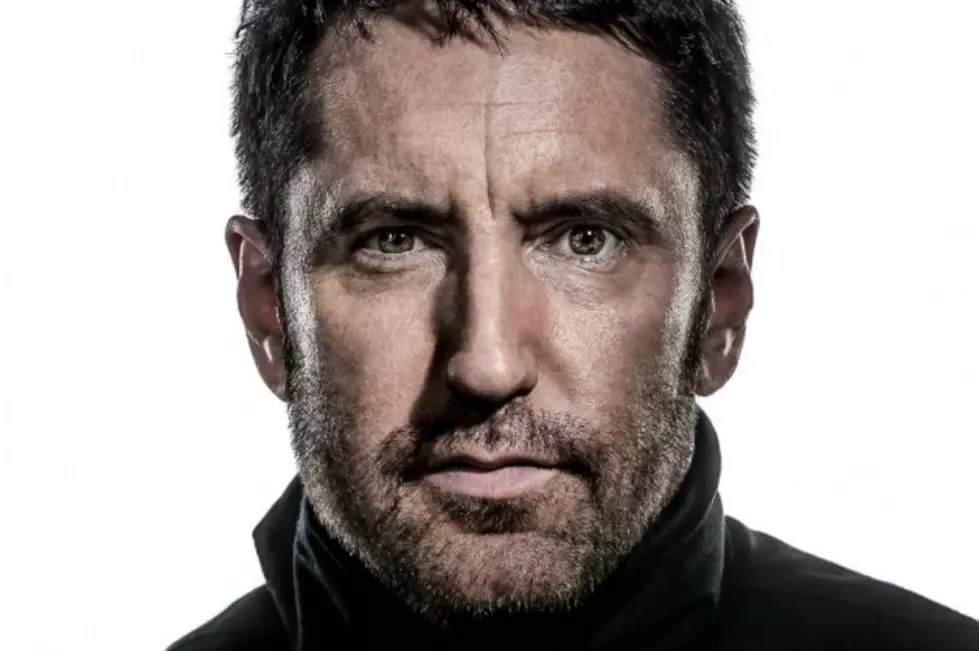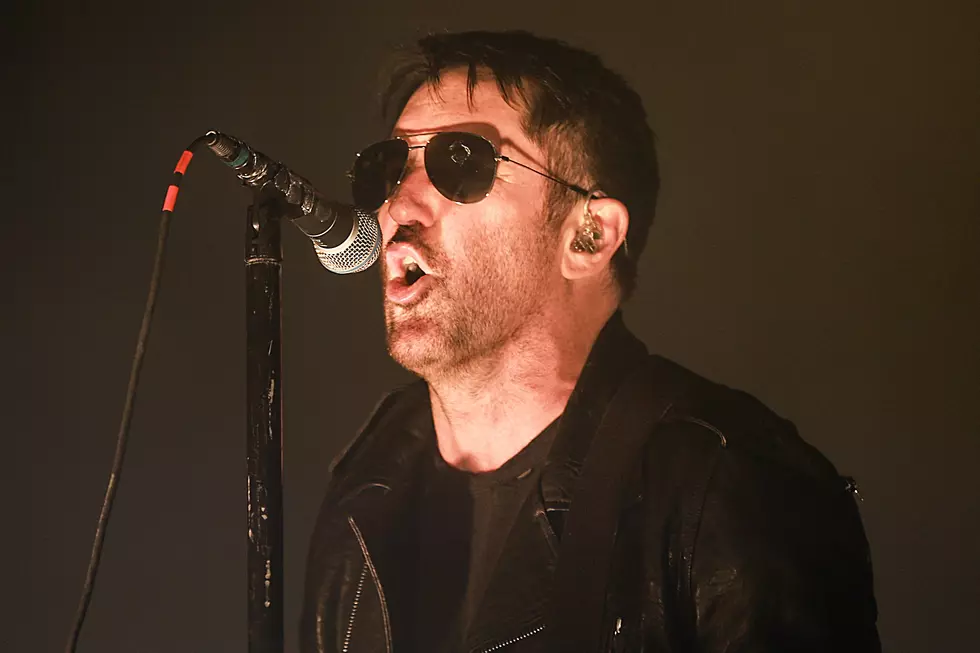
Survivalism: Nine Inch Nails Mastermind Trent Reznor Turns 51
For a man once synonymous with the song “Mr. Self Destruct” in an occupation in which the typical lifespan for geniuses like him is often 27 years, it’s legitimately worth celebrating that he’s survived half a century. In fact, Trent Reznor -- the mastermind of Nine Inch Nails who turns 51 today -- isn’t just surviving.
After embracing the changing technological landscape and reinventing himself as an Oscar-winning score creator, he’s arguably in the best position of his life. Instead of caving to the pressures imposed upon him (both external and internal), he’s used his immense gravity to bend the world around him to become what he wants it to be. In actuality, Reznor is a positive role model – something that most people (especially not Reznor himself) could’ve easily envisioned when he shot to fame 20 years ago.
Reznor, whose real first name is Michael (Trent is his middle name), grew up in the middle of the cornfields north of Pittsburgh – insulated from most outside influence or anything that could be classified as cool. Living with his grandparents following his parents’ divorce, Reznor began playing piano at five years old and went on to play saxophone and tuba in his high school jazz and marching bands. While he would eventually go on to become the brooding poster boy for disenfranchised youth everywhere, Reznor was actually clean cut and popular as a teenager. His high school band director remembers him as “very upbeat and friendly” and once said, “all that ‘dark avenging angel’ stuff is marketing.”
But Reznor did find influence in dark source material – like the films of David Cronenberg and David Lynch. After seeing Lynch’s iconic Eraserhead, Reznor developed a deep-seeded love of the way music and sounds could be interwoven in a way that evokes emotion. In a way, that concept has been the driving force in every artistic endeavor he would embark on. He dropped out of college (where he studied computer engineering) after three semesters and moved to Cleveland, where he was in a New Wave EDM trio that used computers and sampling in such an innovative way that it brought about this now-hilarious news feature in 1985:
Three years later, Reznor created Nine Inch Nails – a far heavier, more industrial solo project in which he played the role of an aural auteur: painting with sound and textures the way Lynch uses images and weirdness. With obvious influences pulled from Ministry and Skinny Puppy but with more synth-pop hooks in the vein of Joy Division and Gary Numan, Nine Inch Nails’ earliest incarnation was a revelation in certain circles but didn’t immediately take over the world. Pretty Hate Machine, released in 1989, was a slow burner that took two years to sell 500,000 copies. But once singles “Down in It,” “Head Like a Hole” and “Sin” made their way into the mainstream, the album eventually became one of the first indie albums to be certified platinum.
Trent Reznor the musician is often obscured by Trent Reznor the myth.
He put himself through a painful separation from TVT Records when he felt the company was interfering with the band's direction – leading to a painful and prolonged court battle that kept him from releasing anything new. But when the smoke cleared, he had the Broken EP and a much more metal-influenced sound that took him out off the dance music charts and into alternative nation. He's potentially the most important figure in bringing techno elements into mainstream rock, spawning not only an entire sub-genre of metal but also infusing electronics into everything from the '90s on. Reznor also made the masses aware of the fact that music can be made by one person with a computer – something that seemed like a novelty just a decade earlier.
From there, he began his ascent of the pop culture consciousness – and Trent Reznor the musician is often obscured by Trent Reznor the myth. Of course, he added to it by recording his magnum opus, 1992's The Downward Spiral, in the Hollywood mansion where Charles Manson's disciples killed actress Sharon Tate in 1969. Although Reznor was falling into his own personal abyss – getting wrapped up in substance abuse and personal conflicts – the record is actually a concept album. But the innovation of The Downward Spiral isn't necessarily in the lyrics; it's in the way Reznor layers eclectic sounds and samples into an alternately brutal and beautiful cacophony.
While the album made him a target for the conservative right, it made him an anti-hero for a generation eternally in search of one. During this era, Reznor made his first foray into film – assembling the soundtrack for Oliver Stone's Natural Born Killers – and he was integral in turning Marilyn Manson into a household name by producing 1996's Antichrist Superstar. In 1997, he realized a dream by creating music for and producing the soundtrack to David Lynch's Lost Highway.
It took Reznor five years to create a follow-up to The Downward Spiral, but once The Fragile was released in 1999, it was immediately apparent what caused the hold up. An ambitious double-album, it's an intricately arranged and meticulously crafted exercise in atmospherics over individual songs – one that debuted to massive first week sales but quickly dropped off due to its challenging nature. Reznor again dropped off the map until re-emerging in 2005 with the song-driven With Teeth, and by then he had abandoned the his pale and gaunt appearance – along with many of his unhealthier habits. He hit the gym, bulked up and cut his hair, looking all but unrecognizable from trademark self. The dystopian concept album, Year Zero, followed in 2007, but his dislike for the major label prompted him to break away on his own soon after.
Reznor has become a master of using sonic textures to create unease – often with minimalism and subtlety that materialize as if from nowhere and everywhere.
He surprised everyone by making an album nobody was expecting, the entirely instrumental Ghosts I-IV, available for free online – something Beyonce never even could've conceived of in 2008. Just a few months later, he released The Slip – a more conventional (but still wildly experimental) collaboration with composer and arranger Atticus Ross. The pair became so prolific that director David Fincher asked them to write the score for 2010's The Social Network. Using Reznor's knack for creating incredibly specific but abstract soundscapes, they won an Oscar for the glitchy score. The duo then put together the group How to Destroy Angels with Reznor's wife, Mariqueen Maandig on vocals, and they've released two EPs and a full-length to date.
Reznor and Ross scored Fincher's The Girl With the Dragon Tattoo in 2011 and then returned to Nine Inch Nails for the outfit's eighth album, Hesitation Marks, in 2013. Last year, Reznor and Ross teamed up for their third Fincher score – this time for Gone Girl, which brought them another Oscar nomination. Their music is so successful because it often verges on not being music at all. Just as Reznor had learned from Eraserhead, he's become a master of using sonic textures to create unease – often with minimalism and subtlety that materialize as if from nowhere and everywhere. It becomes part of the tapestry of the narrative, like another character unto itself.
For those who remember Reznor best as an industrial goth icon railing against whatever establishment you've got, it's almost inconceivable that he's turning 50. Sure, so are Eddie Vedder and Rob Zombie. But Reznor will forever be associated with teenage angst and disillusionment in a way that is intrinsic to his musical persona. While they may always have mostly been manufactured facets of his image, Reznor could've easily flamed out into irrelevance the way Manson has or turned into a parody of himself. Instead, it's possible that he's always been a step ahead of the future – from adopting computers as instruments to eschewing the label system to moving away from needing to rely on album sales to make a living at all.
We may never see another massive Nine Inch Nails tour, but that doesn't mean we've heard the last from Nine Inch Nails – who became eligible for induction into the Rock and Roll Hall of Fame this year but didn't make the cut. Reznor, however, doesn't really care if they make it in, just as he's never really cared about what anyone thinks. And if that mentality has brought him to this point, it's probably best to trust him. We'll all catch up in a couple years.
Worst to First: Every Nine Inch Nails Album Ranked
More From Diffuser.fm









